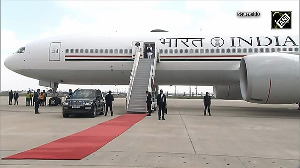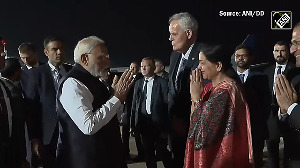Prime Minister Manmohan Singh would have his tete-a-tete with Obama in Bali in a surreal setting, says MK Bhadrakumar, and draws comparisons with the US-China encounter in Honolulu
If an occasional Indian was spotted loitering impatiently on the beaches of Hawaii over the weekend, that wouldn't have come as surprise. He had a boat to catch for Bali -- where Prime Minister Manmohan Singh and United States President Barack Obama are slated to meet later this week -- and the pundit was needed to measure the complicated US-China tango on the sidelines of the APEC summit in Honolulu.
The rhetoric that the 21st century is going to be America's 'Pacific century' gave an unprecedented backdrop to the proceedings to Obama's nine-day tour of the Asia- Pacific, a region that forms part of India's "extended neighbourhood" by our newest security doctrine.
The US rhetoric was wide open to interpretation and many in Delhi came perilously close to estimating that the US is gearing up for a "cold war style" containment strategy toward China. But Honolulu instead presented a breathtaking display of US-China interdependency that no more lends itself to archaic cold war strategies.
Obama's remarks at the APEC CEO Business Summit Q&A just before going in for the one-on-one with Hu says it all.
Corporate America doubtless has a decisive say in plotting the trajectory of US-China partnership and if the cogitation in Honolulu is any reliable indicator, the US business executives have no "death wish" to kill the goose that lays the golden egg. Their demand is two-fold: China must give greater access to its market and should do more to give protection to their intellectual property rights.
For meeting this objective, what is needed is engagement. Obama didn't dispute their contention when he said the US desires 'friendly and constructive competition'. Later, he told Hu that being 'the world's largest countries and largest economies, cooperation between the US and China is vital not only to the security and prosperity of our own people but also vital to the world.' Obama even saw 'constructive cooperation' between the US and China as the collective wish of the Asia-Pacific community, which would be a 'basis for the continued growth and prosperity' of the region.
Why did the US temper its rhetoric as the final countdown began? One, it is a familiar diplomatic style for the US to arrive in great flourish on any big occasion. The chronicle of Soviet-American summits overflows with theatrics. We Indians had better get used to US rhetoric as the final countdown begins for any US-China summit taking place in the decades to come.
Put simply, the Honolulu interactions of Obama with Corporate America gave the profound sense that China's 300-million middle class is today the ultimate catch prize for America's economy to get out of its hopeless rut. China's domestic market is a veritable gold mine for US businesses.
Reuters news agency took a poll among the US business executives who were at the Q&A with Obama in Honolulu. As many as 40 percent of them said their 'single biggest growth opportunity comes from the rise of spending power' in China. Caterpillar Inc CEO President Rich Lavin said, 'At Caterpillar, we're really encouraging continuing behind-the-scenes discussions and negotiations to move China toward a stronger currency.'
Interestingly, Obama took a conciliatory note on the acrimonious yuan issue. The point is, yuan rose by seven percent in the past one year and 30 percent since 2005 and it is not even certain that the exchange problem is what is causing the deep structural problems in the US economy.
The paradox is that US also has stakes in China's economic growth. If China slows down, its deleterious impact won't spare US businesses. Hu told Obama, 'China will steadily advance the reform of the exchange rate mechanism with the goal of ensuring a market-based and managed floating exchange rate system that is tied to a basket of currencies.'
Evidently, while the yuan issue is the sexiest in the political theatrics, what is critically important for both the US and China is increased market access. US multinationals want a level playing field in the Chinese domestic market which, they complain, gives a fast track for the state-owned Chinese enterprises competing with foreign companies. China, on the other hand, seeks removal of export controls on high-technology products to China and would expect the US to make it more feasible for Chinese companies to invest in America.
However, the central issue lies somewhere else. As Robert Kapp, former president of the US-China Business Council put it, the 'extent to which Western capitalism fell on its rear end' during the financial crisis altered the relationship between the two countries. 'There's a different psychological landscape. No one can get a job in the West and the Chinese economy is growing at nine percent a year.'
This implicit eyesore struggled to appear during the Obama-Hu meeting. Obama offered, 'I am confident that the US-China relationship can continue to grow in a constructive way based on mutual respect and mutual interests.' Hu replied: 'China looks forward to maintaining and strengthening dialogue and cooperation with the United States, to respect each other's major concerns, appropriately manage sensitive issues, and ensure that the China-US relationship will continue to grow on a sustainable and stable path.' [Emphasis added.]
Hu suggested better 'communication and coordination' and reminded Obama that the Asia-Pacific countries are 'like passengers on the same boat', implying that he would be exceedingly unwise to rock the boat. Hu's all-important message to Obama was that the crux of the two countries' partnership lies in respecting each other's key interests.
Obama responded that the US welcomes a 'stronger, successful, prosperous and stable' China to play an 'even greater role' in international affairs and that the US respects China's legitimate role in the Asia-Pacific. The message from Honolulu is once again that it is a very complicated relationship, but a long-term relationship that promises to be mutually beneficial.
The rest is grandstanding. To be sure, as he took leave of Honolulu, Obama was back to normal, playing up his domestic audience. 'Enough's enough,' he said, raising his voice. 'We're going to continue to be firm that China operate by the same rules as everyone else. We don't want them taking advantage of the United States.'
He literally repeated Mitt Romney's script, who said just ahead of him, 'We have to have China understand that, like everybody else on the world stage, they have to play by the rules.'
Of course, neither front-runner -- Obama or Romney -- could hope to match the rhetoric of Rick Perry, Republican contender who is struggling to keep pace with them: 'I happen to think that the Communist Chinese government will end up on the ash heap of history if they do not change their virtues.'
Obama faces a tough challenge. He still has a fighting chance, unlike Perry, to win the 2012 election. Yet, Romney is not to be underestimated as weeks roll on and the going gets tough and he is free to ratchet up the China rhetoric.
The tricky part is that US politicians on the campaign trail tend to cross limits and say awful things. But they rapidly cool down, and as Singapore's Prime Minister Lee Hsien Loong put it nicely when asked about the tidal wave of anti-China sentiment building up in the US, 'they tend to take more balanced positions' once they win the election.
Prime Minister Singh would have his tete-a-tete with Obama in Bali in a surreal setting. After the plain-speaking he heard from Hu, Obama needs to recalibrate his political posturing in front of his own economically weary nation which is still to make up its mind whether to give him a second term.









